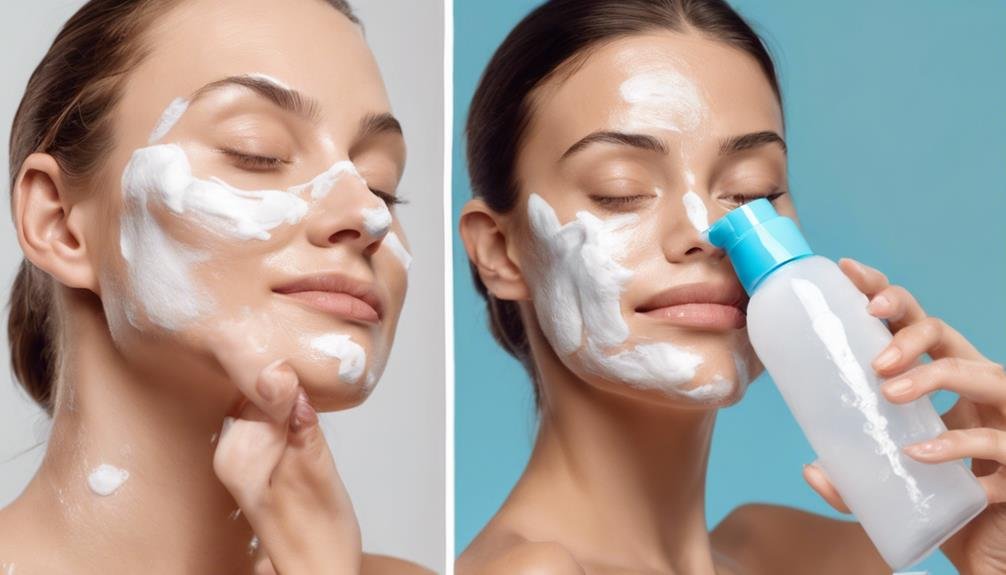Did you know that skin problems affect approximately 85% of people at some point in their lives? By adopting simple yet effective skincare practices, you can significantly reduce the likelihood of encountering these issues. From understanding your skin type to incorporating sunscreen daily, there are numerous strategies that can help you maintain healthy and radiant skin. Stay tuned to discover practical tips on how to navigate the world of skincare and proactively address common skin concerns.
Key Takeaways
- Keep skin hydrated with water and moisturizers to prevent dryness and irritation.
- Establish a consistent skincare routine with gentle products suitable for your skin type.
- Protect skin from UV rays by using sunscreen daily and wearing protective clothing.
- Get enough sleep for skin regeneration and firmness, and exercise regularly for circulation and detoxification.
- Remove makeup gently to avoid skin damage, and consult professionals for tailored skincare solutions.
Importance of Skin Hydration
Ensuring adequate skin hydration is crucial for maintaining healthy skin. Your skin is the body's largest organ and plays a vital role in protecting you from external elements. When your skin lacks proper hydration, it can lead to a range of issues such as dryness, flakiness, irritation, and even premature aging. Hydrated skin is more plump, elastic, and has a radiant glow.
To keep your skin well-hydrated, it's essential to drink plenty of water throughout the day. Water helps to hydrate your skin from the inside out, keeping it supple and healthy.
Additionally, using a moisturizer that suits your skin type can help lock in moisture and prevent water loss. Look for ingredients like hyaluronic acid, glycerin, and ceramides, which are known for their hydrating properties.
Incorporating hydrating serums and masks into your skincare routine can also provide an extra boost of moisture when needed. Remember, hydrated skin is happy skin, so prioritize hydration for a healthy and glowing complexion.
Choosing the Right Skincare Products
When it comes to skincare, selecting the right products is key to maintaining healthy and radiant skin. With a myriad of options available, it's essential to understand your skin type and concerns before choosing skincare products.
For oily skin, opt for oil-free and non-comedogenic formulas to prevent clogged pores. Dry skin benefits from products with hydrating ingredients like hyaluronic acid and glycerin. Sensitive skin requires gentle, fragrance-free products to avoid irritation. Combination skin may need a tailored approach, using different products for varying areas of the face.
Look for products with beneficial ingredients such as antioxidants, vitamins, and peptides to nourish and protect the skin. Consider consulting with a dermatologist for personalized recommendations based on your specific needs. Remember, consistency is key when trying new products to allow time for your skin to adjust and show results.
Establishing a Consistent Routine
To maintain healthy and glowing skin, establishing a consistent skincare routine is crucial. Your routine should include cleansing, toning, moisturizing, and protecting your skin from the sun.
Start each day by cleansing your face with a gentle cleanser suitable for your skin type. Follow up with a toner to remove any remaining impurities and balance your skin's pH levels. Moisturizing is essential to keep your skin hydrated and supple, so choose a moisturizer that suits your skin's needs. Don't forget to apply sunscreen every morning to protect your skin from harmful UV rays.
In the evening, repeat the cleansing and toning steps before applying a nourishing night cream to help repair and rejuvenate your skin while you sleep.
Consistency is key when it comes to skincare routines. Stick to your regimen even on days when you feel tired or lazy. By establishing a consistent routine, you can maintain healthy and radiant skin for years to come.
Understanding Your Skin Type
Understanding your skin type is fundamental in creating an effective skincare routine tailored to your specific needs. There are generally four common skin types: oily, dry, combination, and sensitive.
Oily skin tends to produce excess sebum, leading to shiny skin and potential acne breakouts.
Dry skin lacks moisture, often feeling tight and flaky.
Combination skin is a mix of both oily and dry areas on the face.
Sensitive skin is prone to irritation and redness when exposed to certain products or environmental factors.
To determine your skin type, observe how your skin feels throughout the day. Oily skin may become greasy quickly, while dry skin might feel tight and itchy. Combination skin will have oily areas on the forehead, nose, and chin (T-zone), and dry patches elsewhere. Sensitive skin may react to new products with redness or stinging.
Once you understand your skin type, you can choose appropriate products and treatments that cater to your skin's unique needs, helping you achieve a healthy and radiant complexion.
Protecting Your Skin From UV Rays
Protecting your skin from UV rays is crucial for maintaining its health and preventing damage. Exposure to ultraviolet (UV) radiation from the sun can lead to premature aging, sunburn, and an increased risk of skin cancer. To shield your skin effectively, follow these expert tips:
Tips for Protecting Your Skin From UV Rays
| Tip | Description | Importance |
|---|---|---|
| Wear sunscreen | Apply a broad-spectrum sunscreen with an SPF of 30 or higher to shield against UVA and UVB rays. | High |
| Seek shade | Limit sun exposure during peak hours (10 a.m. to 4 p.m.) when UV rays are strongest. | Moderate |
| Wear protective clothing | Dress in long sleeves, pants, sunglasses, and wide-brimmed hats for added sun protection. | High |
| Use lip balm with SPF | Protect your lips by using a lip balm that contains SPF to prevent sun damage. | Moderate |
| Reapply sunscreen | Remember to reapply sunscreen every two hours, or after swimming or sweating. | High |
Following these guidelines will help safeguard your skin from the harmful effects of UV radiation, preserving its health and vitality.
Managing Stress Levels
Shielding your skin from UV rays is just one aspect of maintaining its overall health and appearance. Another crucial factor that significantly impacts your skin is managing stress levels. Stress can lead to various skin issues such as acne, eczema flare-ups, and premature aging. When you're stressed, your body releases cortisol, a hormone that can increase oil production in your skin and trigger inflammation. This can result in breakouts and dullness.
To combat these effects, prioritize stress management techniques like deep breathing, meditation, exercise, or engaging in activities you enjoy. Getting an adequate amount of sleep and maintaining a healthy diet can also help regulate stress levels and promote skin health. Remember, taking care of your mental well-being is just as vital as your skincare routine for achieving healthy, glowing skin.
Avoiding Harsh Chemicals
To maintain the health and appearance of your skin, it's crucial to be mindful of the products you use and the ingredients they contain. Harsh chemicals can strip your skin of its natural oils, leading to dryness, irritation, and even more serious issues in the long run. When choosing skincare products, opt for gentle cleansers, moisturizers, and treatments that are free from sulfates, parabens, phthalates, and artificial fragrances. These chemicals can disrupt the skin's natural balance and cause unwanted reactions.
Look for products labeled as "natural," "organic," or "hypoallergenic," as they're less likely to contain harsh ingredients. Reading the ingredient list and doing some research on unfamiliar components can also help you make informed decisions about the products you use on your skin.
Additionally, consider patch testing new products before applying them to your face to check for any potential sensitivity or allergic reactions. By avoiding harsh chemicals and opting for gentle, skin-friendly products, you can help maintain a healthy and radiant complexion.
Maintaining a Healthy Diet
Eating a healthy diet plays a vital role in maintaining the overall health and appearance of your skin. What you consume affects how your skin looks and feels. Including nutrient-rich foods in your diet can help promote glowing, youthful skin. Here are some essential nutrients and their food sources that can benefit your skin:
| Nutrient | Food Sources |
|---|---|
| Vitamin C | Oranges, strawberries |
| Vitamin E | Almonds, sunflower seeds |
| Omega-3 | Salmon, chia seeds |
| Zinc | Chickpeas, pumpkin seeds |
| Antioxidants | Blueberries, spinach |
Ensuring you have a balanced intake of these nutrients can aid in maintaining skin elasticity, fighting inflammation, and protecting against sun damage. Additionally, staying hydrated by drinking an adequate amount of water is crucial for healthy skin. Remember, what you put inside your body is as important as what you apply on the outside.
Getting Sufficient Sleep
Ensuring you get sufficient sleep is paramount for maintaining healthy skin. When you don't get enough rest, your skin can appear dull, tired, and may even develop more wrinkles and fine lines.
During deep sleep stages, your body repairs and regenerates skin cells, producing collagen that helps keep your skin firm and youthful. Lack of sleep can also lead to increased cortisol levels, which can break down collagen and elastin, accelerating the aging process.
To promote optimal skin health, aim for 7-9 hours of quality sleep each night. Establish a relaxing bedtime routine, limit screen time before bed, and create a comfortable sleep environment. If you struggle with sleep, consider techniques like meditation, deep breathing exercises, or consulting a healthcare professional for advice.
Regular Exercise for Skin Health
For maintaining optimal skin health, incorporating regular exercise into your routine is essential. Exercise not only benefits your overall health but also has a positive impact on your skin. Here are some key reasons why regular exercise is crucial for healthy skin:
- Boosts circulation: Exercise increases blood flow, delivering essential nutrients and oxygen to your skin cells, promoting a healthy glow.
- Reduces stress: Physical activity helps in reducing stress levels, which can prevent flare-ups of skin conditions like acne and eczema.
- Promotes collagen production: Regular exercise stimulates collagen production, which enhances skin elasticity and reduces the appearance of wrinkles.
- Flushes out toxins: Sweating during exercise helps in clearing out toxins from your skin, keeping it clear and vibrant.
Properly Removing Makeup
To maintain the health and clarity of your skin, it's important to pay attention to how you remove your makeup. Properly removing makeup is crucial in preventing skin issues such as clogged pores, breakouts, and irritation.
Start by choosing a gentle makeup remover that suits your skin type. Oil-based removers are great for breaking down stubborn makeup, while micellar water is a good option for sensitive skin.
When removing makeup, be gentle and avoid harsh scrubbing that can damage the skin. Use a soft cloth or cotton pad to gently wipe away the makeup, focusing on areas like the eyes and lips where makeup tends to be heavier. Follow up with a gentle cleanser to ensure all traces of makeup are removed.
Remember to be thorough in your makeup removal routine, as leaving makeup residues on your skin overnight can lead to clogged pores and breakouts. By taking the time to properly remove your makeup, you can help maintain the health and beauty of your skin.
Seeking Professional Help When Needed
If you find yourself struggling with persistent skin issues despite following a diligent skincare routine, seeking professional help from a dermatologist or skincare specialist may be necessary. These experts can provide personalized recommendations and treatments to address your specific skin concerns.
Here are some reasons why seeking professional help is crucial:
- Accurate Diagnosis: Professionals can accurately diagnose your skin condition, ensuring you receive the most effective treatment.
- Specialized Treatment: Dermatologists have access to advanced treatments and procedures that can significantly improve your skin health.
- Prevent Further Damage: Getting professional help early can prevent skin issues from worsening and causing long-term damage.
- Tailored Skincare Regimen: Experts can create a customized skincare regimen tailored to your skin type and concerns, maximizing the effectiveness of your routine.
Don't hesitate to consult with a professional if you're facing persistent skin problems. Your skin deserves the best care possible, and seeking help from a specialist can make a significant difference in your skin's health and appearance.
Frequently Asked Questions
Can Genetics Play a Role in Skin Problems?
Yes, genetics can significantly influence skin problems. Your inherited genes dictate factors like skin type, sensitivity, and susceptibility to conditions. Understanding your genetic predispositions can help tailor your skincare routine and preventive measures for optimal skin health.
How Does Pollution Affect Skin Health?
Pollution negatively impacts skin health by clogging pores, leading to breakouts and premature aging. To protect your skin, cleanse regularly, use antioxidants, and wear sunscreen. Stay hydrated and consider air purifiers or barrier creams for added defense against environmental pollutants.
Is It Necessary to Exfoliate Daily?
You don't need to exfoliate daily. Over-exfoliating can strip your skin's protective barrier, leading to irritation and dryness. Aim for 2-3 times a week for most skin types. Consult a dermatologist for personalized recommendations.
Can Hormonal Changes Impact Skin Conditions?
Hormonal changes can indeed impact skin conditions. Fluctuations in hormones can lead to acne breakouts, increased oil production, and skin sensitivity. It's essential to be mindful of these changes and adjust your skincare routine accordingly for optimal skin health.
What Role Does Climate Play in Skin Issues?
In maintaining healthy skin, climate can significantly impact skin issues. High humidity can exacerbate acne, while dry environments may lead to increased skin dryness. Protect your skin by adapting your skincare routine to the climate you're in for optimal health.
Conclusion
By following a consistent skincare routine tailored to your skin type, you can avoid common skin problems and maintain a healthy complexion. Remember to keep your skin hydrated, choose the right products, and protect it from UV rays. Imagine your skin glowing with vitality, free from issues like acne or dryness. With proper care and attention, you can achieve skin that radiates health and beauty.






